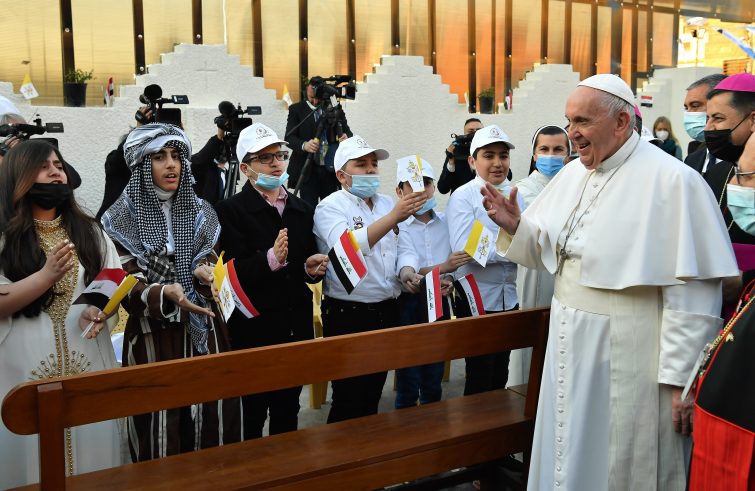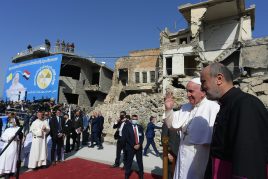
“Creating educational and teaching programmes aimed at strengthening the fraternal bond of all the Iraqi people and at enhancing national unity; awareness-raising activities valuing the diversity of Iraqis, including seminars, conferences and TV programmes on cross-cultural, inter-religious and inter-civilizational interactions with the objective of highlighting the common ground, of understanding and respecting diversity; a national education centre with classrooms and a library for the promotion of inter-religious dialogue with a view to eradicating fanaticism and preventing young people from embracing it; enforcing the Iraqi Penal Code No. 111 of 1969 and its provisions on the protection of the Holy Sites, envisaging offences against religions and their symbols with penalties for the offenders.” These are the four “practical proposals” outlined in a document released on April 5, exactly one month after the visit of Pope Francis to Iraq (March 5-8), by Cardinal Louis Raphael Sako, Chaldean Patriarch of Baghdad.
A visit to be harnessed.“Iraqis of all faiths and religions must make the most of this visit to turn over a new leaf and
usher in a new season of human fraternity and reconciliation,
respect for diversity, peace-building, rebuilding the country, reviving its dilapidated institutions, helping displaced people return to their regions and homes, thereby bringing peace and a dignified life to its citizens, as all human beings deserve”, the Cardinal said. “Human fraternity and diversity” are the key words of the Patriarch’s statement that draws on the Encyclical Letter “Fratelli tutti” and on the “Document on Human Fraternity” co-signed with the Grand Imam of Al-Azhar, Ahmad al-Tayyib in Abu Dhabi, “endorsed” – the Cardinal writes – by Grand Ayatollah Ali al-Sistani, the most prominent Shiite leader in Iraq, with his eloquent phrase: ‘You are part of us and we are part of you'”. “Human fraternity,” for Patriarch Mar Sako, “is the ultimate aspiration of all societies and religions, and it should be a cornerstone for rejecting extremism and hatred, for changing our mindset and outlook, with a view to building mutual trust and moving forward together as brothers and sisters embracing tolerance, love and respect for diversity, to build a world of greater peace, justice and dignity. Indeed, mutual cooperation paves the way for the future.” The Cardinal pointed out that “all Iraqis, by principle and by constitution, are citizens with the same rights and duties. Citizenship cannot be limited to religion, creed, region, race or number. Citizenship is a universal right for all.” Patriarch Sako thus declared:
“It is now time to separate Religion and State and establish a secular State”.
“as has been the case in Christian western societies for a long time, and as the State of Sudan is currently in the process of establishing. A civil or secular State,” said the Cardinal, “is not hostile to religion, it respects all faiths, but it does not incorporate religion into politics. A civil State must guarantee freedom of religion and worship for all Iraqis as equals and ensure the respect of human rights, enshrined in all international Treaties.”
The way of human fraternity.Recalling Pope Francis’ courtesy visit to Ali al-Sistani and the meeting in Ur with the representatives of the Abrahamic religions in Iraq, the Chaldean Patriarch emphasised that“every individual can follow his/her religion and traditions, provided that he/she respects the religion of their fellow other, does not treat them as non-believers, or betray them, nor exclude or oust them. Such diversity flows from the will of God”.
does not treat them as non-believers, or betray them, nor exclude or oust them. Such diversity flows from the will of God”.
“Unfortunately,” His Eminence added, “some have wrongly assumed that the Pope was calling for the merging of all faiths into a single religion. This is not true at all.
Human fraternity is not about unifying religious identity into a single religion. In fact it is an invitation to each and every one of us, precisely on the basis of our own religion, to preserve it by showing openness and respect for the faith of our brothers and sisters. Human fraternity and diversity are the driving forces for our survival and progress, and we must therefore put them into practice in our daily lives. In this respect, the decision of Iraqi Prime Minister, Mustafa Al-Kadhimi, to declare 6 March each year as the “Day of Tolerance” is of great significance. We must not give into despair in the face of extremist fringes and misconceptions, or surrender when confronted with divisions.” Card. Sako concluded: “we must persevere in strengthening our fraternity and the respect for diversity, and strive to ensure that everyone may enjoy what is good and just, and live a life of joy and happiness according to the will of God.”










